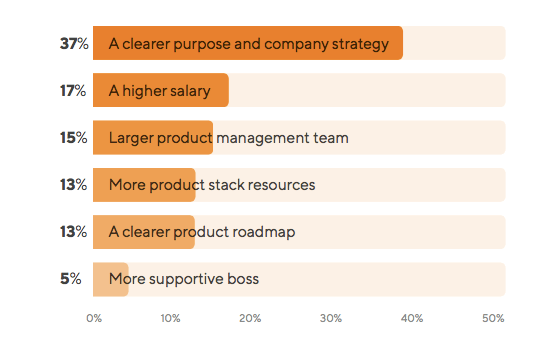Despite general happiness with their jobs, many product managers are still looking to improve some things, and there are some key things they want to change this year. That was one of the takeaways from our Product Managers in 2020 Report with answers from more than 2,500 product management professionals.
We asked them what they wish they could change in 2020. The vast majority of responses were for things that would help their company succeed versus enrich them personally. In fact, only 17% wished for a higher salary, and just 5% wanted a more supportive boss. Everything else reflected a yearning to better things for their products and businesses.
So what do most product managers want this year and believe would have the most significant benefits? Let’s take a look.
Purpose and Strategy
By far, the change product managers want most this year was a clearer purpose and company strategy (37% of respondents). This response is not surprising, yet it’s also an indictment of many corporate cultures.

From the outside, it’s easy to think most companies know what they’re doing and have solid plans and strategies guiding their execution. Products launch, marketing campaigns unfurl, and execs stroll onto stage, announcing the next big thing. It’s all so slick and well-produced — it’s hard to imagine otherwise.
Yet behind the scenes, things are often much different… as nearly 1,000 product professionals in a single survey have indicated. Far too often, product strategy remains undefined. Or it changes too frequently to serve as an anchor for prioritization and planning.
“Executive endorsement and backing are critical,” says a Product Manager working for a Medical Device Manufacturer with 1000+ employees. “Make sure that the company has a clear purpose and direction for the product management function.”
When companies are reacting instead of being proactive—or are impatient and continuously changing course—product managers don’t get a real chance to devise and execute longer-term plans.
For product managers to succeed, they need a clear, well-defined vision for the product and goals to aim for. Without these in place, it’s hard to know if they’re doing the right thing. Whether it’s a North Star metric, an unwavering mission, or reliable stakeholder alignment regarding key objectives, product managers must know what their shooting at to have a chance at hitting it.
One software product manager at a small company placed the blame on management.
“Executives that are not strategic enough utilize the ‘we’re agile’ buzzword to make up an excuse for the absence of a Vision, Mission, and Strategy.”
Is Data-Driven Decision-Making to Blame?
There may be no single smoking gun that’s driving this lack of consistent strategy. But some respondents hint that we may have taken analytics too far. It’s relatively new to have easy access to reams of real-time data and the tools to crunch it quickly.
Because it’s readily available and viewed by many as an infallible ingredient in the decision-making process, many stakeholders demand using quantitative data for every choice. The importance of gut instincts, common sense, and qualitative research get diminished.
Furthermore, the ability to track things consistently enables management to keep finding metrics they want to improve via tweaks and minor changes. This can lead to businesses endlessly chasing short-term wins instead of investing in (and sticking with) longer-term strategies.
Said one financial services executive, “Industry focuses a lot on data driven-decision making. If you’re truly innovating, then there isn’t much data available. At times you just need to trust your gut, take a risk, and fail fast.”
There are plenty of pitfalls SaaS product managers should avoid when it comes to data-driven decision making.
One product manager at a mid-size telecommunications firm warns about a “fixation on revenue or other specific KPIs without focusing on other KPIs that could reveal trends with dire consequences.”
Team Size
Every organization has someone complaining that they don’t have enough resources. Fixing this is what 15% of what product managers want this year for 2020.
The concept of a product management team is still kind of new to many organizations. Many product managers are still “lone wolves” reporting to the CTO or VP of marketing rather than belonging to a dedicated product team.
But as the profession matures and specialization becomes increasingly common, some product managers are desperate for more help. There’s so much asked of them, but they don’t have enough cycles to give everything the attention it deserves. Most product teams are falling short of their ideal size and are ready to scale.
Another take on this is that specialization has also bred confusion about what a product manager should do.
“There are a lot more players in the space of product ops, product analytics, and other more niche product management roles,” says one product manager at a large company in the healthcare industry. “It creates many opportunities but also even more gray space around what really is product.”
Tools
Not too long ago, the Microsoft Office Suite was about all a product manager could expect to use on their computer. Type up requirements in Word, manage the feature queue in Excel, build a roadmap in PowerPoint, and track the schedule in Project. While doable, these are far from ideal tools for product managers.
But the profession’s maturity has created a market opportunity for niche solutions tailored just for product managers. Plus, many product development resources also work in product management tasks.
As product managers learned from peers and thought leaders how helpful these tools could be, they’re finding their product stack isn’t as stacked as they’d like. That’s why the top choice of what 13% of product managers want to change this year is to fill out their product stack in 2020.
We’re obviously big fans of product roadmapping tools. Product managers are also seeking better ways to manage customer research, persona development, and processing feedback. And there’s plenty of project management solutions that are helpful for product folks, too.
One respondent believes the product stack isn’t complete unless the product team is interfacing with development tools. “I see it’s important to connect product management tools with enterprise and engineering tools to get real-time and non-intrusive status on the product for better decision making,” said a product manager from a large software company.
If you find yourself longing for something new in your product stack, finding the budget for it may be part of the problem. But there are some creative ways to scrape together the funds for the tools you need.
Clearer Roadmaps
Product roadmaps are the showcase for product managers, yet 13% are hoping they get a lot clearer in 2020. The issues product managers face today tend to stem from two areas: what’s in the roadmap and who’s driving it.
According to a product manager at a large media and entertainment company, they haven’t yet managed to “nail the move away from feature fixation to customer outcomes.” As we’ve mentioned before, features don’t belong on roadmaps. They replace themes and outcomes.
But just as problematic is prioritization coming from the wrong sources. “Another widespread source of weak product management is the stakeholder-driven roadmap, especially when the product organization is not doing its job in helping the stakeholders succeed,” said a product manager from a large healthcare company.
Likewise, a lack of high-level thinking and consensus building can let other departments take the driver’s seat. “Invest in preparation and strategy; otherwise, you don’t have figures and numbers to back your proposition and choices,” says a product manager from a mid-size software company. “If not, sales especially, R&D, also will always choose the roadmap and the product strategy instead of you.”
Is Agile to Blame?
The most common topic giving product managers heartburn is Agile. It’s endlessly discussed, written about, and debated, yet people still disagree about it regularly. The near-religious fervor some adherents bring to the table isn’t always helpful, either.
For product managers, it’s created a “debacle between product ownership and product management,” according to a product manager at a mid-size software company. Another chimed in that “Firms say they want a product manager, but they just want a glorified scrum master.”
Says another product manager in the software industry, “dilution of product management and the industry splitting the product manager and product owner roles. This split results in product owners being delivery managers and not customer-centric.”
Beyond role definition, the Agile process itself is a frequent complaint. For example, one product manager from a mid-size software company blames practitioners trying to force processes into situations where it’s not a good fit.
“There is this trend towards over-complication. Product Management should be simple and effective. Agile is a buzzword, lots of organizations want to use it, very few are doing it well. Focus on what works well for your team, not what is the most cutting-edge for the industry. If they happen to be the same great thing, but your focus should ALWAYS be on how you can help get the most out of the team.”
Others, such as this project manager from the legal industry, worry that the ability to continually adjust is causing companies to lose sight of the bigger picture. “Ensure the speed and efficiency gained from Agile methodologies don’t distract from longer-term product and cross-product strategies and alignments.”
Anticipating What’s to Come
If product managers could see the future, the job would be a lot easier. But most of us don’t have any superpowers. We’re reduced to following trends and trying to stay on top of what’s coming down the pike.
New technologies are always popping up. However, the three areas survey respondents consistently raised were artificial intelligence, machine learning, and blockchain. While a small segment of products actively uses this tech today, the real issue is understanding how they will either enhance or disrupt the products and industries product managers work in.
At the same time, product managers often must temper the excitement of executives who get hung up on buzzwords and are demanding answers right away. They need some realistic expectation setting to tamp down some of the hype.






